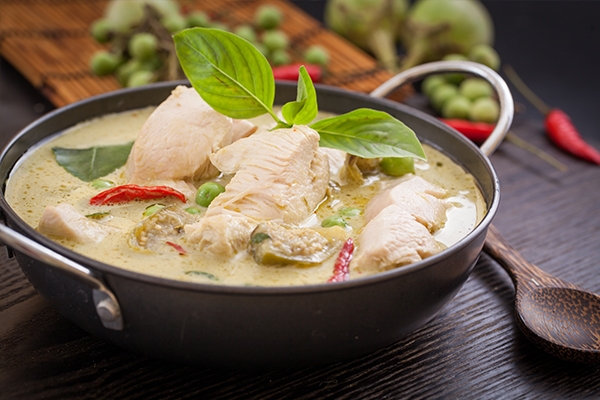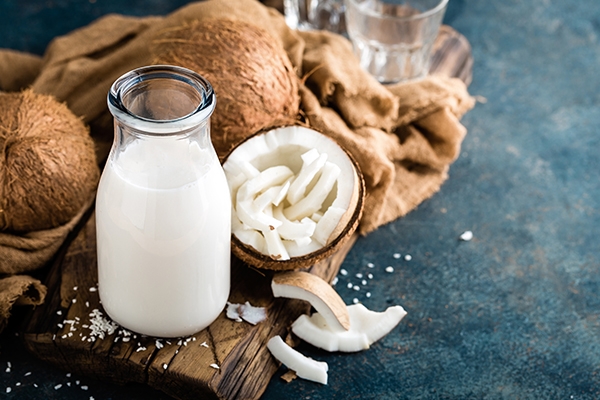Benefits & Dangers of Coconut Milk Food

What tree has nearly all of its parts that are useful? It's a coconut palm!
In Sanskrit, the coconut is known as the Kalpavriksha, or Divine Tree. So named because almost every part of the coconut tree (Cocos nucifera) has numerous benefits.
Coconut milk is a product of the coconut tree. Coconut milk is popular for food processing due to its sweet and savory flavor, as well as its fragrant aroma. During religious holidays such as Lebaran (Eid al-Fitr), coconut milk dominates almost all dishes. There's chicken opor with ketupat and sambal goreng hati, rendang with vegetable curry and lontong, empal gentong, and soto betawi.

In addition, coconut milk is used as a beauty treatment. In Indian Ayurvedic medicine, coconut milk is a natural remedy for stomach aches caused by bacteria. Coconut milk is also thought to strengthen teeth and keep them from decaying.
Coconut milk is a natural hair cleanser. Even today, coconut milk is used as a base ingredient in a variety of skincare products. It is believed to preserve skin healthy and supple. Coconut milk also moisturizes the skin and removes makeup and dirt from the pores.
Benefits of coconut milk on health

Coconut milk is produced by blending grated flesh from mature coconuts with water and then filtering it. This milky white substance is loaded with minerals and vitamins. According to the Indonesian Ministry of Health, pure coconut milk contains significant amounts of zinc, potassium, and copper.
Coconut milk consumed in accordance with RNI can improve concentration and cognitive abilities, support brain development and function, and provide neurological benefits.
Coconut milk is also anti-inflammatory, aids in weight loss, strengthens the immune system, and improves cardiovascular health.
Tasty, but high in calories and saturated fat
Despite its abundance of nutrients, coconut milk has a high glycemic index of 97. As a result, consuming too much coconut milk may cause blood sugar levels to rise. Likewise, 100 grams of pure coconut milk contain 34.30 grams of fat.
It is best not to consume more than one cup of coconut milk per day (150 ml). This is equivalent to accumulating saturated fat, which increases the risk of heart disease and stroke.
The risks of consuming too much coconut milk are as follows:
1. Possibility of gaining weight
Consuming foods containing coconut milk alongside high-carbohydrate foods has the potential to increase body weight, especially if not balanced with physical activity.
A 250-ml cup of unsweetened coconut milk contains 8 grams of sugar. This contributes to weight gain and an increase in blood triglyceride levels.
Coconut milk contains a lot of calories. One cup of pure coconut milk contains 552 calories, which is roughly one-third of the daily calorie requirement.
2. Causing diarrhea
Coconut milk's high fiber content causes gas formation in the stomach and raises bowel pressure. As a result, stool thickening becomes difficult. This is why we get stomach problems or diarrhea after eating a lot of foods containing coconut milk.
A high fat content in the stools can also cause loose stools or diarrhea. When fat is not completely digested and absorbed by the body, this condition develops.
3. Cholesterol issues
Coconut milk, when consumed in moderation, can increase good cholesterol. However, consuming too much coconut milk can raise cholesterol levels. This is because coconut milk contains a lot of saturated fat. Every 300 mL of coconut milk contains 90% saturated fat, which exceeds the daily recommendation.
"It's important to note that coconut milk contains a lot of fat and should be consumed in moderation," said Jesse Feder, a clinical dietitian at Memorial Regional Hospital South. "Its high fat content contributes to increased cholesterol levels, which, if consumed in excess, can potentially clog arteries and increase blood pressure," he added. However, there is no need to completely avoid it. You can easily eat it in smaller portions!
4. Calcium deficiency
When used as a milk substitute, coconut milk can cause calcium deficiency.
Coconut milk contains only 38.4 mg of calcium per 240 mL cup, or 3% of the calcium NRV (NRV). Cow's milk with 2% fat contains 305 mg of calcium per 250 mL, or 23.5% of the NRV—nearly 8 times as much calcium as coconut milk.
People who are lactose intolerant or allergic to milk protein frequently substitute coconut milk. Coconut milk, on the other hand, does not meet the daily calcium requirement. A consistent calcium deficiency will have an effect on bone and tooth health, especially in infants, children, adolescents, and pregnant women.
Healthy coconut milk cooking methods
Coconut milk contains good fats. However, if cooked incorrectly, it can become saturated fat.
Rista Yulianti Mataputun, S.Gz., a nutritionist at Indriati Hospital Solo Baru, shared tips for eating healthy coconut milk dishes.
1. Cooking time of three minutes maximum
Cooking coconut milk dishes for an extended period of time should be avoided. The recommended cooking time is three minutes, and they should not be heated for too long. Improper cooking methods can raise cholesterol levels in the body. You can add the coconut milk right before serving.
2. Do not reheat coconut milk dishes
When you reheat coconut milk dishes, an oil layer forms. This layer is harmful due to its high fat content.
3. Avoid combining high-cholesterol foods with dishes made with coconut milk
Avoid combining high-cholesterol foods with coconut milk, such as offal and tripe. This is why dishes made with coconut milk may contain high levels of cholesterol.
So, what's your favorite meal? Ketupat or lontong sayur? Perhaps nasi uduk? Or nasi kuning? You don't have to be afraid of eating foods containing coconut milk. Whatever it is, you don't have to be afraid of eating foods with coconut milk. What matters is that you understand the safe limit for your health.
If you have any questions about health problems as a result of eating too much coconut milk-based food, click on WhatsApp.



